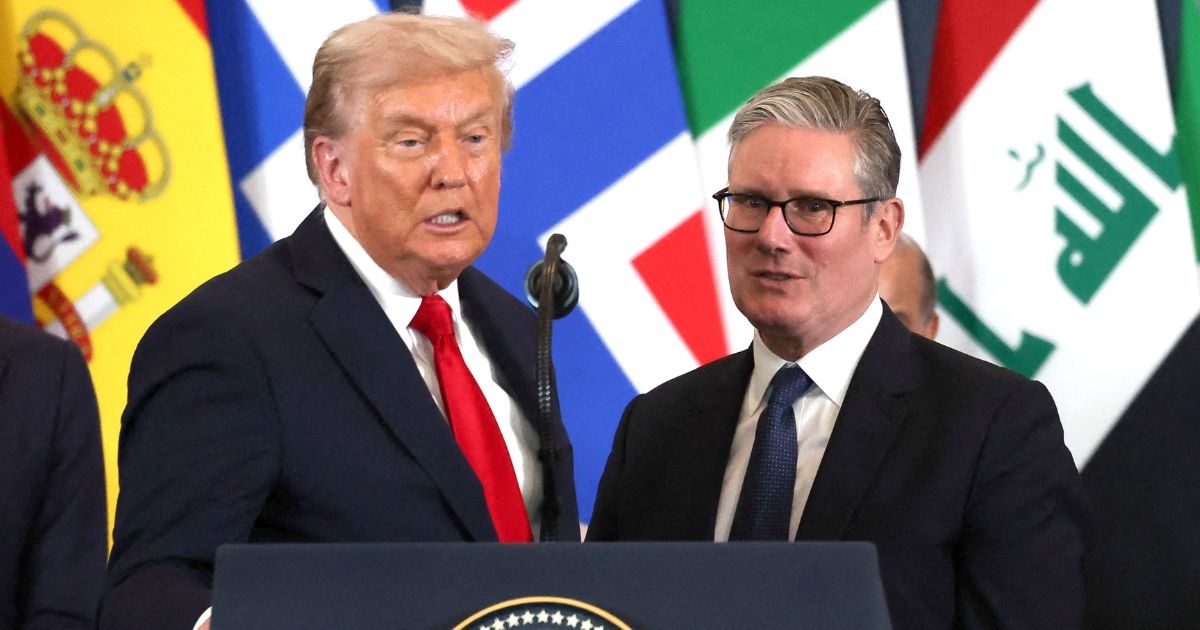Monday marked a historic and deeply emotional milestone — the long-awaited ceasefire in the Middle East after two years of unrelenting conflict. It was a day of somber reflection and cautious celebration: peace at last for many who had suffered, justice inching closer for those responsible, and, unexpectedly, a moment of comic relief for observers watching a global stage filled with world leaders.
At the center of that levity stood U.K. Prime Minister Keir Starmer — and former U.S. President Donald Trump.
During a press briefing in Sharm El-Sheikh, Egypt, where leaders gathered to solidify the ceasefire and discuss a roadmap for a postwar settlement, an awkward and highly public exchange unfolded. Trump, who was presiding over the summit, began introducing the attending dignitaries in alphabetical order. Starmer, seemingly expecting to speak, waited behind the podium, only to realize — to his visible discomfort — that Trump had made sure the United Kingdom was called last.
As the introductions rolled on, Trump stepped back to the microphone just as Starmer prepared to address the audience, effectively cutting him off in a moment that drew both laughter and raised eyebrows.
To some, the gesture seemed petty. To others, it was a deliberate piece of political theater — Trump’s pointed reminder that diplomacy is also performance.
The summit, described by The Wall Street Journal as “a meeting aimed at spurring momentum for a broader postwar settlement,” focused on ensuring that Hamas would be excluded from any future Palestinian political structure before renewed talks about a two-state solution.
That’s where the tension between Trump and Starmer takes on new weight. The British prime minister had recently moved to formally recognize Palestine as a sovereign state — a decision widely criticized in Jerusalem. “You are giving a huge reward to terrorism,” Israeli Prime Minister Benjamin Netanyahu said bluntly, accusing Starmer of undermining unity among Western allies at a critical time.
Starmer defended his decision, saying the move was intended “to keep alive the possibility of peace and a two-state solution,” insisting it was “not a reward for Hamas,” and emphasizing that the group “could have no role in government or security.” Yet his recognition came while Gaza remained under Hamas control — at least in part — and just weeks before the group’s formal surrender under the new ceasefire terms.
For many observers, that contradiction weakened Starmer’s credibility at the summit. And, intentionally or not, Trump appeared to drive that point home.
As Trump moved through the introductions, he couldn’t resist adding his trademark flair. He complimented Italian Prime Minister Giorgia Meloni, calling her “beautiful,” and joked about Iraq’s oil wealth, saying, “There’s so much oil there they don’t know what to do with it.” Meloni laughed openly, while Starmer shifted uncomfortably beside her, eyes darting toward the floor, brushing at his face as Trump’s remarks continued.
By the time Trump reached the U.K. in the alphabetical lineup, it was clear who was in control of the stage — and who wasn’t. The former president treated Starmer with the same dismissive ease one might use with a restless child at an adult dinner party: tolerated, but not taken seriously.
The moment quickly spread across social media, with clips circulating under headlines describing Trump as “putting Starmer in his place.” Whether viewed as diplomatic theater or a calculated slight, it underscored the sharp contrast between the two men — and how, even at a global peace summit, Trump’s instinct for dominance and spectacle remains as sharp as ever.
Trumps lists every single Country & leaving the UK until last – before snubbing Starmer who thinks he’s about to speak on the World Stage.
It’s always custom to thank people in their order of significance.
Trump knows exactly what he’s doing & deliberately humiliated Kier… pic.twitter.com/93rKiOtASK
— Concerned Citizen (@BGatesIsaPyscho) October 13, 2025
Trump effectively boxed him out from the podium like a power forward muscling in front of a point guard after a free throw — a subtle reminder of just how much control he held over the moment.
And, to drive the point home, a few minutes later Trump addressed the assembled leaders with a grin: “Friends of mine, you great people. I have a couple I don’t like in particular, but I won’t tell you who. I actually have a few I don’t like at all — but you’ll never find out who they are. Ah, maybe you will.”
Trump: I have known so many of you for so long. Your friends of mine, you great people. I have a couple I don’t like in particular but I won’t tell you who. I have a few actually I don’t like at all but you will never find out who they are. Maybe you will. pic.twitter.com/81cXvLugnu
— Open Source Intel (@Osint613) October 13, 2025
Yeah, “maybe.” It’s at moments like this that one can’t help but lament the limitations of The Associated Press Stylebook — which The Western Journal generally adheres to, aside from its more “woke” conventions — since it strictly forbids the use of laugh emojis in journalistic writing. If ever there were a time to break that rule, this would be it — one could easily justify pasting about twenty of them right here.
This kind of pointed public embarrassment couldn’t have happened to a more fitting person, or on a more fitting day. Just a month after recognizing what amounts to a murderous geopolitical fantasyland as a legitimate nation-state — largely to appease Labour’s fragile coalition of far-left and Muslim voters — Keir Starmer now finds himself sidelined at the very table where he hoped to lead. He gambled on endless conflict, and instead, peace arrived, leaving him out of the deal entirely. Well played, Prime Minister.
In effect, Starmer made a quiet pact with terror — and terror folded. Perhaps he shouldn’t have taken quite so large a sip from that poisoned chalice before the adults sat down to talk, Sir Keir.

